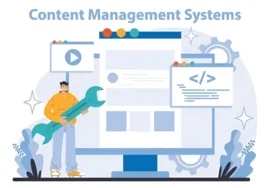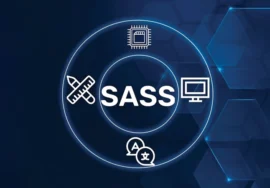
Right CMS for Your Project: A Comprehensive Guide
In the ever-evolving digital landscape, a well-designed website stands as a cornerstone for businesses and organizations of all sizes. However, building and maintaining a website for content management can feel intricate and intimidating. This is where a Content Management System (CMS) steps in, empowering users to create, edit, and publish website content without requiring extensive coding expertise.
However, with a vast array of CMS options available, selecting the ideal platform for your specific project can prove to be a daunting task. This comprehensive guide aims to equip you with the knowledge and steps necessary to confidently navigate the CMS selection process.
Unveiling Your Project’s Needs
The foundation for a successful CMS selection process lies in a clear understanding of your project’s specific requirements. Here are some key questions to consider:
- Website Purpose and Functionality: What is the core aim of your website? Are you seeking a simple blog, a complex e-commerce platform, or something that falls somewhere in between?
- Content Management Volume: How frequently will you be adding or updating content? How many users will require access to the CMS for content management?
- Technical Expertise: What level of technical comfort does your team possess? Is a user-friendly interface a top priority, or are you comfortable with a more technical platform?
- Scalability Considerations: Do you expect significant growth in traffic or complexity for your website over time?
Essential Criteria for CMS Selection
Once you have a firm grasp of your project’s needs, you can evaluate potential CMS options based on these crucial criteria:
- Ease of Use: A user-friendly interface is paramount, especially for those with limited technical expertise. Consider the platform’s learning curve and get intuitive editing tools.
- Feature Functionality: Does the CMS offer the features you require, such as drag-and-drop editing functionalities, SEO optimization tools, or built-in e-commerce capabilities? Ensure the CMS can accommodate your current and future project needs.
- Security Measures: A secure CMS is essential for safeguarding your website from cyberattacks. Evaluate the platform’s security measures and its track record in maintaining a secure environment.
- Scalability Potential: Can the CMS handle potential growth in traffic and complexity? Cloud-based solutions often offer seamless scalability to accommodate future demands.
- Community and support: A vibrant community and a reliable support system are invaluable assets. Look for a CMS with active forums, comprehensive tutorials, and technical support when needed.
Popular CMS Options: A Glimpse
While providing an exhaustive list of all available CMS platforms falls beyond the scope of this article, here’s a curated selection of some of the most popular CMS options to consider for your project:
- WordPress: An open-source platform renowned for its user-friendliness, WordPress is ideal for creating blogs, portfolios, and basic websites. Its extensive plugin library offers a wide range of functionalities to enhance your website’s capabilities.
- Drupal: Another open-source solution, Drupal, is a powerful and versatile platform that caters to complex websites requiring extensive customization. It offers a steeper learning curve compared to WordPress, but its flexibility empowers developers to build intricate and unique websites.
- Wix: A user-friendly website builder, Wix is well-suited for beginners who are creating simple websites. Its drag-and-drop interface simplifies the website creation process, making it an attractive option for those with limited technical knowledge.
- Shopify: A leading e-commerce platform, Shopify offers a comprehensive suite of features specifically designed for online stores. It streamlines the process of setting up and managing an online store, making it an excellent choice for businesses venturing into e-commerce.
Beyond the Big Names: Exploring Additional Options
While the aforementioned platforms represent some of the most popular CMS options, it’s crucial to explore other potential contenders that might better suit your project’s specific needs. Here are some additional options to consider:
- Headless CMS: This decoupled approach separates the content management backend from the website’s front-end presentation layer. Headless CMS platforms offer greater flexibility for developers and can be particularly suitable for complex websites or applications requiring integration with various platforms.
- Static Site Generators: These tools are ideal for creating simple, content-driven websites. They generate static HTML files from content written in Markdown or other formats, resulting in fast loading times and enhanced security. However, they might not be the best choice for websites requiring frequent content updates or user interaction.
Taking the Platform for a Test Drive
Many CMS platforms offer free trials or demo versions, allowing you to experience the platform firsthand before committing. Take advantage of these opportunities to explore the interface, test key functionalities, and assess the overall user.
Absolutely! Taking a test drive is a crucial step in choosing the right CMS for your project. Here’s how to make the most of it:
1. Identify Your Testing Goals:
Before diving in, determine what aspects of the CMS you want to evaluate. Here are some areas to consider:
- Ease of Use: Can you intuitively navigate the interface and create content without difficulty?
- Feature Functionality: Does the platform offer the specific features you need, like drag-and-drop editing or image optimization tools?
- Customization Options: How easy is it to customize the website’s design and layout to match your brand identity?
- Content Management Workflow: Is the content creation and editing process smooth and efficient?
2. Leverage Available Resources:
Most CMS platforms provide ample resources to guide you through the trial process. Look for:
- Tutorials and Documentation: Many CMS platforms offer comprehensive tutorials and documentation that explain key functionalities and best practices.
- Sample Websites: Explore pre-built templates or sample websites to understand the platform’s design capabilities and content organization options.
- Support Channels: Utilize online forums, chat support, or knowledge-based articles to address any questions or troubleshooting issues encountered during the trial.
3. Hands-on Exploration:
Don’t just passively browse the platform. Go through the motions of creating and editing content, managing user permissions, and exploring different design options.
- Content Creation: Create a sample page or blog post to assess the editing tools and content workflow.
- User Management: If multiple users manage content, explore user roles and permission settings.
- Design Customization: Experiment with theme options or sample layouts to get a feel for the platform’s design flexibility.
4. Simulate Your Real-World Usage:
During your test drive, try to replicate your current website needs as closely as possible. This will give you a more accurate understanding of the platform’s suitability for your project.
- Content Volume: If you anticipate a high volume of content, try creating multiple pages or posts to gauge performance and ease of management.
- Specific Features: If you require specific functionalities like e-commerce integration or user forums, test them thoroughly during the trial.
- Team Collaboration: If multiple team members are using the CMS, involve them in the trial to assess collaboration features and user access management.
5. Take Notes and Compare:
While exploring different CMS platforms, keep detailed notes of your experience. Document things like:
- Ease of use: How intuitive was the interface?
- Feature availability: Did the platform offer the functionalities you need?
- Learning curve: How long did it take to get comfortable with the platform?
- Overall impression: Did the CMS feel like a good fit for your project?
I’d appreciate it if you could document your experiences, which will help you compare different platforms objectively and make an informed decision about the best CMS for your specific needs.





